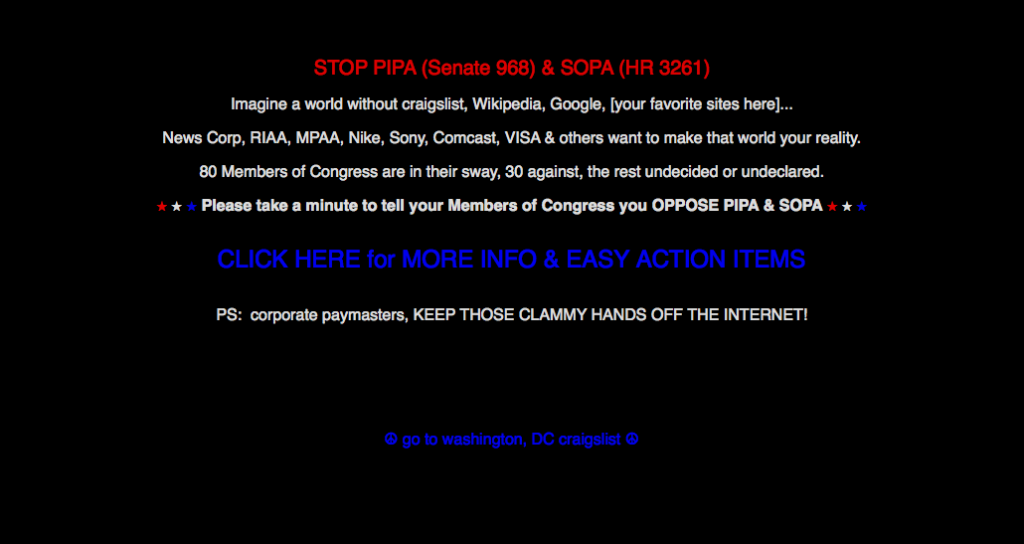The PROTECT IP Act (Preventing Real Online Threats to Economic Creativity and Theft of Intellectual Property Act of 2011 or PIPA), which was introduced by Senator (D-VT) on May 12, 2011, aims to give the US government and copyright holders additional tools to curb access to “rogue websites dedicated to infringing or counterfeit goods”, especially those registered outside the U.S. On the House side, the Stop Online Piracy Act (SOPA) was introduced by Rep. Lamar S. Smith (R-TX) on October 26, 2011. The bills had bipartisan support and were expected to sail through Congress. But today, passage of the bills are is looking more and more unlikely as SOPA and PIPA opponents’ voices grow louder and members of Congress are flooded with calls and e-mails about the bill.
Unless you live under a rock, you’ve no doubt read about, heard about and discussed the SOPA blackout that’s happening all over the Web. Web giant Wikipedia has gone dark to protest SOPA and PIPA, while others like Craigslist, Google, Wired, WordPress and dozens of other sites have put prominent messaging and graphics that clearly show opposition to the proposed legislation. Wired and WordPress show large portions of their home pages blacked out as if they have been censored.
Wow. Let’s just stop and consider the reach of these Web site giants.
Google is ranked by Alexa as the number 1 site in the US and is visited by half of ALL global Internet users daily. So at least half of us today got messaging from Google about SOPA and PIPA. If you use the search tool embedded in your browser, you missed the black censor bar over the Google logo and the simple plea to: Tell Congress: Please don’t censor the web!, but the Google logo is still blacked out in the top left corner of all pages.
If you ignored Google’s censor logo and call to action, you probably did a search on Google and found a link to Wikipedia, which was blacked out for the day (just the English version). Alexa says Wikipedia is the 6th most popular site on the Web, so millions of us didn’t get to use Wikipedia to look up names, places and things.
If you were looking for a job, car or apartment today, you probably went to Craigslist, the 9th most popular site in the US. Although Craigslist did not go completely dark, an intro page urges everyone to oppose SOPA and PIPA.
And oh yeah, even though Facebook and Twitter didn’t join the dozens of sites that participated in the SOPA blackout, the conversations on these sites were dominated by SOPA and PIPA.
And then of course, there was the overwhelming coverage about the SOPA blackout by mainstream press, alternative press and bloggers.
All of this means that today, January 18, I would bet that the vast majority of American got some kind of exposure to SOPA and PIPA, most of it negative. And if just a fraction of the millions of Google, Wikipedia, Craigslist, Reddit, Wired, WordPress (and on and on) users took action and contacted their representatives and Senators, today was a very busy day on Capitol Hill.
That’s one heck of a grassroots movement. How about you? How many sites did you visit that had some mention or call to action re: SOPA and PIPA? Did you contact your representative in Congress?






One reply on “How a Nation Got Educated About SOPA and PIPA”
This was a really great blog post, Joanna. It shows how the internet is revolutionized our world. According to a few articles that I have read, today’s generations are using the Internet as a protesting platform more and more than ever before. Google, Wikipedia and others used somewhat of a simple means to get their messages across, and it worked! Like many others, I shared Google’s message on my Facebook page and I contacted my representative.